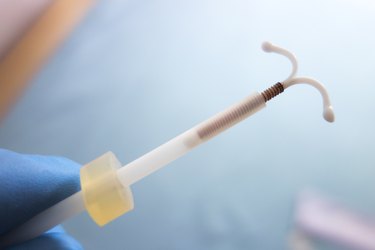
Intrauterine devices (IUDs) are a type of birth control that are inserted into the uterus. Like many forms of contraception, IUDs can come with side effects. It's possible to experience side effects even after your IUD is taken out — for instance, some people notice weight loss after IUD removal.
An IUD is a T-shaped device with two strings attached. It is inserted into the uterus and creates an inhospitable environment for sperm, thereby preventing pregnancy, according to the Cleveland Clinic. They can last from three to 10 years, depending on which type of IUD you have.
Video of the Day
Video of the Day
Here are the different types of IUDs:
- Copper IUDs: This non-hormonal version of the IUD prevents pregnancy by triggering an inflammatory response that makes it difficult for sperm to fertilize eggs. Paragard is the brand name for this type of IUD.
- Hormonal IUDs: These hormonal IUDs release the progestin hormone levonorgestrel, which makes it hard for sperm to reach eggs and discourages egg release. Mirena, Liletta, Kyleena and Skyla are the brand-name options.
IUD removal can sometimes cause side effects, according to NYU Langone Health. These can include:
- Cramping
- Bleeding
- Fainting
Some people also report gaining or losing weight after IUD removal. While the evidence to support this side effect is slim, it's possible that changes to your birth control routine can influence your weight — here's what to know about research on IUD removal and weight loss.
Warning
If you experience severe cramps, fever, chills or unusual discharge after your IUD is removed, let your doctor know, according to NYU Langone Health.
Will You Lose Weight After IUD Removal?
Birth control can cause a variety of side effects. Some people report gaining weight on hormonal birth control, which is why you might be wondering if removing your IUD helps with weight loss.
However, according to a January 2014 study in the Journal of Women's Health, the researchers found that short-term weight changes were not linked to birth control.
That said, hormonal birth control can lead to extra fluid retention, which may contribute to minor weight gain, per a June 2017 study from the Institute for Quality and Efficiency in Health Care. But will removing your IUD help you lose that weight?
Indeed, it's possible that you may experience weight loss after Mirena, Liletta, Kyleena or Skyla removal (or other types of hormonal birth control). That's because when you stop taking birth control, you may retain less water and thus drop a few pounds.
Similarly, removing your hormonal IUD may lead to hormonal shifts that influence your appetite, which can also contribute to weight loss.
But what about non-hormonal birth control — can copper IUDs like Paragard contribute to weight loss? While anecdotal evidence suggests that some people experience weight loss after copper IUD removal, the science is not conclusive.
Average Weight Loss After IUD Removal
Because most studies don't find a link between birth control and weight changes, there are no estimates of the average weight loss after IUD removal.
However, if you experienced minor weight changes due to lack of or extra fluid retention while on birth control, you may gain or lose a few pounds after your IUD removal if you start to retain water differently.
Will You Gain Weight After IUD Removal?
Now you know you can lose weight after IUD removal. But what about weight gain?
Turns out the same factors that contribute to weight loss after IUD removal also have the potential to influence weight gain.
Some people retain more water after stopping hormonal birth control, which could lead to gaining a few pounds. As your hormones return to normal levels, your appetite could increase, which may also contribute to minor weight gain.
- Cleveland Clinic: "Intrauterine Device (IUD)"
- NYU Langone Health: "Intrauterine Device Removal"
- Journal of Women's Health: "Weight and Body Composition Changes During Oral Contraceptive Use in Obese and Normal Weight Women"
- Institute for Quality and Efficiency in Health Care: "Contraception: Do hormonal contraceptives cause weight gain?"
Is this an emergency? If you are experiencing serious medical symptoms, please see the National Library of Medicine’s list of signs you need emergency medical attention or call 911.